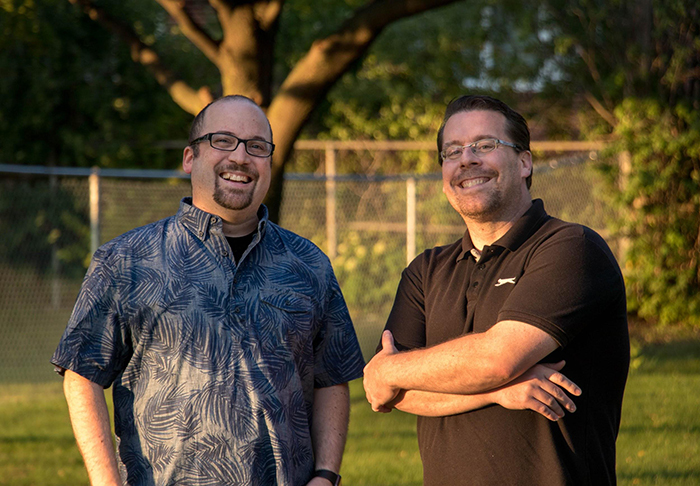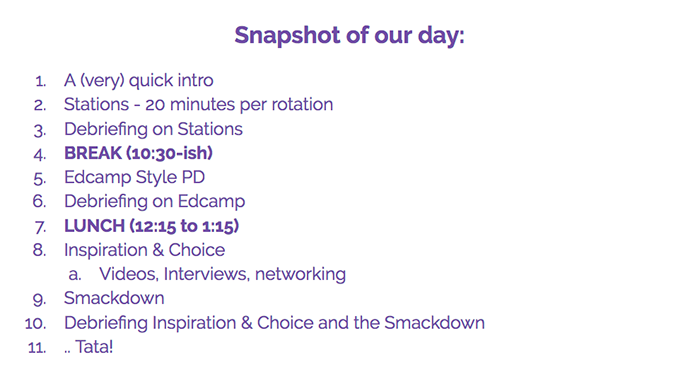Doing PD Differently: A Conversation with Avi Spector from the RÉCIT Network
The fall is upon us and many IT-REPs and REPTICs in the college network are back in the swing of things, supporting individual teachers who are trying new approaches and technologies in their classrooms. Many have also begun preparing for upcoming ped days – thinking about how to provide professional development (PD) opportunities for faculty that will have a positive impact on their respective college. I recently had the opportunity to meet with Avi Spector from Quebec’s RÉCIT network and asked him about his approach to working with teachers. The approach he is currently using can be an inspiration for us all.
About Avi Spector and the RÉCIT Network

Avi Spector, from the RÉCIT network with the author.
A Montreal native, Avi taught from 2002 to 2007, initially with Concordia University as an undergraduate professor and was subsequently hired at Riverside School Board to teach option courses like Web Design and Graphic design with Adobe Photoshop. In 2007, he was hired as a professional (Pedagogical Consultant) at Riverside School Board and began working in the RÉCIT network. RÉCIT stands for the Réseau pour le développement des compétences des élèves par l’intégration des technologies. This was translated into English as Resource people for the development of Competencies using Information and Communication Technologies.
The RÉCIT network supports teachers from the elementary and secondary level as well as adult education and vocational education centres across the province. Avi is the RÉCIT responsible for Regional Service for General Adult Education in English school boards. There are 9 English school boards with close to 20 adult education centres that are served by the provincial and regional RÉCITs. According to Avi, each day is different and depends on the needs of the teachers the RÉCITs are working with. Even if our day-to-day realities and clientele are distinctive and different in the college network, I discovered that there is much we can learn from each level of instruction!
Avi mentioned early in our conversation that he works closely with his colleague Tracy Rosen, who is the RÉCIT Provincial Service for Adult Education (Editor’s Note: Check out Tracy’s website for lots of inspiring resources). Avi also stated that he collaborates a great deal with LEARN Quebec.
Changing Focus in the Last Decade
Avi told me that when the RÉCIT network started about 10 years ago, there was a big push to get teachers to adopt new technology. In the past, Avi’s approach to professional development was more based on pushing content to teachers, namely through technology workshops. “We would come in and have something to tell our teachers.” The paradigm and dialogue have now shifted from these “magic show” presentations to looking at how technology can enhance the pedagogical practice of the teachers. Today, rather than pushing the latest software to them without any reflection, he tries to meet teachers where they are at in their professional approach. Prior to a PD event, he will leave space for the teachers to provide input on what the content of the day will be. Rather than doing teacher training on a certain technology, they will start with a learning objective and see how technology can assist.
Any PD that we do is teacher-centred, and promotes teacher sharing, with teachers making the choice as to their needs. The teacher is the expert, and we value the time each teacher is committing to their development.
Avi believes in reaching out to different sectors of the school boards since they can learn from each other. He encourages the teachers to be self-directed in their professional development and, in turn, have their students mirror this approach and behaviour. In this approach, the learning is more sustainable and clearly has had more impact on those receiving training.
Being empathetic to the reality and needs of teachers, combined with valuing their limited time to commit to PD, Avi is appreciated by the community of English Adult Ed teachers in Quebec. His constant efforts and approach garnered some formal recognition from PROCEDE (Provincial Organization of Continuing Education Directors, English). In 2016 he received the PROCEDE Outstanding Service Award for commitment to the Adult Education and Vocational Training sector.
Addressing Learner Challenges with Modeling and Stations
An important part of Avi’s work is to facilitate sharing and networking among teachers. This is why Avi uses a collaborative approach to the events he runs. He often focuses on offering workshops that are teacher driven and even teacher led, like EdCamps, over traditional workshops. In the past couple of years, Avi and his colleague Tracy have also been exploring a ‘station rotation’ approach to PD events.
Absenteeism in the adult education and vocational training centres is a thorny issue. There was a consensus that student engagement needed to be addressed, and that flexibility in learning might be part of the solution. Avi and Tracy began to talk about ways to ensure that the students kept attending their courses. As they talked about blended learning as a potential approach to achieve their objective to decrease absenteeism and increase student engagement, they became more interested in using the station rotation model with their teachers. By using this approach in professional development situations, they believe that teachers can incorporate this approach into their adult education and vocational centre classrooms as a means of increasing student collaboration and engagement.
An Overview of the Station Rotation Approach at a PD Event
The professional development events that they run have a quick introduction and a variety of stations where teachers spend 20 minutes. The participants start with one station and then move on to the next station. Each station is designed in a way where the learning is self-guided and participants are offered a differentiated approach to learning the material, be it through group discussions, guided reading, or live collaboration using a cloud based tool such as Google Docs or Forms. One of the most important stations is the “teacher station” where participants have the opportunity to interact and discuss with the workshop presenters in small groups. This helps ensure that all participants have a chance to ask questions and interact with the presenter, modelling the same connection that we want to see in the classroom between teachers and students.

A slide from a QPAT 2016 workshop entitled Giving a Shift: Sharing Classroom Practice Around Change, QPAT 2016” (Avi Spector, Tracy Rosen, Kish Gue). Avi and Tracy moderated the day with Kish Gue (RECIT consultant for the English Montreal School Board) and used a station rotation approach during this workshop.
Throughout the day of an event, participants debrief on certain aspects of their learning in EdCamp style. At the end of the day, they hold a ‘smackdown’ where each participant shares something that they learned that day or talk about values or inspiration that came from their activities that day. Running events in this way has the added bonus of creating networking opportunities and new relationships for teachers to offer mutual support and encouragement.
Hot Topics
In addition to our discussion about professional development, I thought it would be interesting to hear about some of the dossiers that our other levels of instruction in Quebec are working on.
When I asked Avi about some of the key topics that the RÉCITs are working on these days, I could see that many of these areas are of equal interest to the REPTICs in the college network, namely:
- Digital citizenship (both for students and teachers)
- Universal Design for Learning (UDL)
- Flexible learning spaces
- Blended learning and distance education
Avi doesn’t just talk the talk when it comes to digital citizenship. He believes in promoting positive values of digital citizenship and ensures that participants have a link to his presentation slides when he speaks at conferences. Whenever possible, he tries to license his works under a Creative Commons license.
This school year, Avi and Tracy are focused on the classroom environment and physical layout by incorporating principles of Universal Design for Learning (UDL). They are working with teachers, administrators, and community partners to explore how a flexible learning environment can help support student-centered learning practices. They believe that adapting the classroom layout and environment, while incorporating implicit use of technology, will best support the different ways that students learn in a competency based approach.
Some Final Thoughts
With the unprecedented changes in technology over the last few decades, our educational system has strived to keep up with the pace of this innovation. Training our students for today and tomorrow is a challenge with the number of new technological possibilities that are presented to us each year.
In this era it seems that we no longer have the time to master a technology before some new competing and disruptive technology arrives. It seems only natural that we should change our approach to professional development so that we can quickly figure things out together and exploit the potential of technology in service of pedagogy.
Avi maintains a blog called Beyond the Tools and has begun documenting the changes to his approach to professional development on the site. In one of his recent ‘Teacher Features’ from 2016, he invites us into the classroom of one of the teachers he is working with in order to see how she has implemented station rotation with her students. This reflex to share best practices is important and will help us to navigate the waves of technology that have shown no sign of slowing down for the years to come.

Avi’s website Beyond the Tools provides a variety of interesting content for teacher development.
In closing, I would like to extend my sincere thanks to Avi Spector for taking some time out from his summer break in order to share his inspiring journey in professional development with the Profweb readership!

